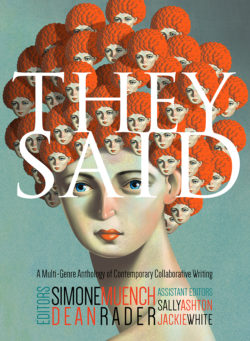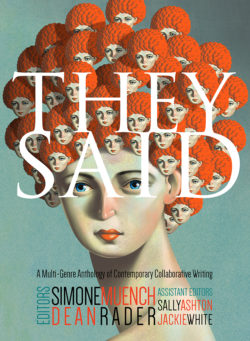This month, selections from a collaborative manuscript of hybrid correspondence between me and my creative partner Rebecca Hart Olander appeared in the August spotlight of Duende and in They Said: A Multi-Genre Anthology of Contemporary Collaborative Writing from Black Lawrence Press. It’s an exciting co-incidence.

It’s been a summer for collaboration and other things “co-“. Rebecca and I have been at work on another manuscript, and in May we co-taught a workshop on collaborative writing at the Massachusetts Poetry Festival.
In June and July, I co-taught a graduate research course for international students who collaborated in the completion of group projects. In just ten weeks, the students reviewed literature on sports marketing, transformational leadership, and co-opetition, which is cooperation among business competitors. And they did it all with much good humor despite little sleep.
When I think of the word “collaboration,” I think of a complex and colorful dynamic like a Kandinsky painting. But the Latin roots are “col” meaning together and “laborare” meaning to work, and to collaborate is simply to work together. That phrase takes me back to grade school, but there’s nothing elementary about collaboration. Every time I see students working together productively, I feel like they’re adding a weight to the world’s scales on the side of harmony. I’m particularly inspired when I see people from around the world working together not only in spite but in appreciation of their differences, as I have at English Now! (a school I can’t recommend highly enough to anyone in the D.C. area wanting to work on English language).
My first month teaching at English Now! I learned an important lesson in collaboration and communication. It was July, and I had a group of young teen students who were visiting D.C. and studying English for a month. They were from Belgium, France, Gabon, Italy, and Russia. It was my first time back in an ESL classroom in quite a while, and I was struck by the differences in the students’ listening and speaking skills. But the bigger challenge was one particular student who was there through parental coercion–an eye-rolling, distracting, snoozing, begrudging participant. I could quite literally see the collaborative nature of communication as my instructions and explanations had widely varying results depending on the students’ skills and motivation.
Having just spent the previous two years working on an MFA, this was a humbling illustration of how the best preparation and presentation of words is only part of the equation of communication. Meaning is a collaboration between speaker and listener, though those categories hugely simplify the work together in which everyone is simultaneously speakers and listeners and so much more–eaters who did or didn’t have breakfast, philosophers working out the meaning of life, kids on the playground trying to make friends. Which words and nonverbal cues will be taken in and how, what feelings, thoughts, and responses they’ll elicit are all up for grabs. Seeing this was actually a huge relief, as it clarified what I could and couldn’t do. I could do my part, but everyone else had to do theirs too. It was kind of like being in an orchestra, but I wasn’t the conductor. I was a fellow musician, and the conductor was our mutual interest or goal–our desire to make music, or learn.
In case the lesson wasn’t clear, life handed me another illustration. I began co-teaching at George Mason University. My first semester, I hung back a lot and observed my teaching partner. Every day I saw how we noticed and thought the same things. For example, if I saw the students were dragging and felt they could use a break, in the next moment my teaching partner would suggest we take a break. If I thought I would relate an idea back to something we said earlier, in the next moment she would do that. I think this showed an overall compatibility between us that would become more apparent to me over time. But it also made me feel less personally responsible for ideas. They were out there to be discerned and acted on, like notes and rhythm.
After I’d learned the course, I took a normal active role in the classroom, and occasionally my teaching partner and I would have different ideas about how to do something. One memorable time, a technical problem resolved the issue for us, and I watched my teaching partner lead the lesson her way. It worked out well, and this was a another huge lesson to me. It didn’t mean that my way wouldn’t have worked, but it showed me that what I thought was important (doing something a particular way) wasn’t as important as I thought. I saw that when everyone wants to play the music, the music gets played. The idea that my planning and best ideas weren’t as crucial as I thought came as another relief. I haven’t stopped crafting lessons using my best ideas, but I don’t feel like those things will make or break the learning, which I’ve begun to see has an autonomy of its own, like a piece of a music, and also participates in the collaboration.

2 responses to “Musings on Collaboration”
Great piece, and I’ve loved working together with you! I was inspired by this passage, as a writer and a teacher: “Every time I see students working together productively, I feel like they’re adding a weight to the world’s scales on the side of harmony.” Nice! I also love “Meaning is a collaboration between speaker and listener” – so true, and it makes me think also of reading creative work.
LikeLike
Reblogged this on rebecca hart olander and commented:
Great post on collaboration by Elizabeth Paul, my creative partner. It’s been wonderful to work together on several writing/art projects, some of which she’s highlighted here. We also share the experience of being teachers, and having been students in a MFA program at the same time. I love Liz’s democratic approach to teaching, learning, and making. Here’s what she has to say about being a writing student: “It was kind of like being in an orchestra, but I wasn’t the conductor. I was a fellow musician, and the conductor was our mutual interest or goal–our desire to make music, or learn.” It’s been great to “make music” with Liz!
LikeLike